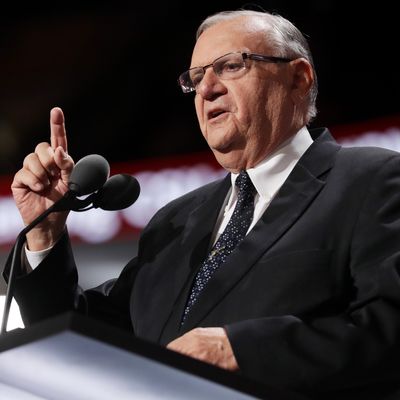
Days before Donald Trump was sworn in as president, the Supreme Court heard the very last case of the Obama administration — a civil-rights dispute over whether high-ranking federal officials can be held accountable for violating people’s constitutional rights. Justice Stephen Breyer, an institutional pragmatist, seemed to seize on the case to portend the heavy lift that awaited the justice system in the years ahead: “There’s no blank check, even for the president,” he said during the hearing. “And if there’s no blank check, that means sometimes they can go too far. And if they have gone too far, it is our job to say that.”
The tragedy of Trump’s “full pardon” of disgraced Arizona sheriff Joe Arpaio is that there’s nothing anyone can do to check it. Certainly not the courts: The pardon is not only unconditional and irrevocable, but also an affront to judicial authority writ large — part and parcel of the president’s ongoing feud with federal judges who don’t rule as he’d like.
The reason Arpaio’s reprieve is a slap in the face to the courts is that the crime originated in the courts. U.S. District Judge Murray Snow — a deeply conservative George W. Bush appointee who for years oversaw a civil case accusing the sheriff of trampling on Latinos’ constitutional rights — held him in contempt of court for doing precisely the thing he was being sued over. Snow had had it with Arpaio’s recalcitrance: He and his cronies “have demonstrated a persistent disregard for the orders of the Court, as well as an intention to violate and manipulate the laws and policies regulating their conduct,” he wrote in a contempt order last year.
Arpaio’s trail of racist lawlessness is endless. But this was the first time that his disregard for the rule of law rose to the level of a criminal offense — Snow found his violations serious enough under federal law that he felt a referral to the Department of Justice was necessary. And once all was said and done, it was Trump’s own Justice Department that prosecuted Arpaio and scored a conviction against him before a different judge just last month. The evidence was conclusive: “Because the Court finds that Defendant willfully violated an order of the court, it finds Defendant guilty of criminal contempt.”
None of that matters now. Trump’s pardon short-circuits the entire process: Arpaio hadn’t even been sentenced yet. The pardon effectively disrupts the work of career DOJ lawyers who were preparing for the sentencing phase; of court officers who were readying a pre-sentence report to guide the sentencing judge; of Arpaio’s own lawyers, who just last week filed court papers seeking to quash Arpaio’s conviction; of the judge who was due to sentence the sheriff in October. The wheels of justice ground to a halt simply because the nation’s chief executive said so. As with other matters that are still within the purview of prosecutors, like Bob Mueller’s inquiry into whether the president obstructed justice in the Russia probe, Trump is once again inserting himself in criminal proceedings that are yet to run their course. As one former White House counsel put it in Lawfare, “a pardon will have every appearance of being direct interference in the administration of justice.”
Trump may very well believe that Arpaio was adjudged a convicted criminal simply for “doing his job,” as he told a cheerful crowd in Phoenix earlier this week. The two share a bond over rounding up bad hombres, after all, and then some. But no law-enforcement officer’s job description includes a carte blanche to violate constitutional rights, let alone flout court orders to stop doing so. On its own terms, the pardon flies in the face of Trump’s purported law-and-order presidency.
Maybe Trump meant for the pardon to be interpreted as a reward for Arpaio’s faithful surrogacy during the presidential campaign. Maybe it’s a presidential show of gratitude for being the only ally with the “guts” to not give up on the birther crusade against President Obama. Or maybe Trump is simply being Trump — playing to his base by pardoning the unpardonable just because he can, and because it would drive the other side mad. “We polled the race stuff and it didn’t matter,” Stephen Bannon infamously told Joshua Green. More red meat for the red-hat crowd.
No one knows what other clemency initiatives Trump has in store for what remains of his presidency, and this one in particular, egregious though it may be, will not result in impeachment. But it’s a harbinger of what’s to come for a president and an administration that will soon be forced to reckon more and more with another lawman who will be sure to treat every interference — and preemptive pardon — as the obstruction that it is. No blank checks there.





























